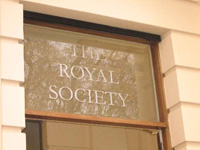Royal Society Demonstrates History of Science Online
The British Researchers have exhibited before the on-line public 60 of the Royal Society's most important papers to mark its 350th anniversary.

The "Trailblazing" website was created by Britain's influential science academy the Royal Society, and includes handwritten papers on some of the most important scientific discoveries of the past three and a half centuries.
Benjamin Franklin's studies on flying a kite in an electrical storm from 1752 show the first time anyone had proposed that lightning is electricity and not a supernatural force.
And Edward Stone's 1763 notes on the success of willow bark in treating fever document the beginnings of the discovery of salicylic acid and the production of aspirin -- now one of the world's most used medicines.
The creators of Trailblazing say it is a "go-at-your-own-pace" virtual journey through science which the Royal Society hopes will inspire members of the public to see science as part of everyday life and culture.
Martin Rees, president of the Royal Society, said the papers showed "a ceaseless quest by scientists over the centuries...to test and build on our knowledge of humankind and the universe."
The papers, taken from past issues of the oldest scientific journal in the English-speaking world, Philosophical Transactions, among others include documents from 1776 on how Captain James Cook saved his sailors from scurvy with pickled cabbage, lemons and malt -- long before ideas about nutrition developed.
They also include Stephen Hawking's early writing on black holes and Isaac Newton's 1672 landmark work on the nature of light and color and 1940 papers on the discovery of penicillin.
Everyone can find a portion of interesting information on the website: www.trailblazing.royalsociety.org
Reuters has contributed to the report.
Subscribe to Pravda.Ru Telegram channel, Facebook, RSS!


